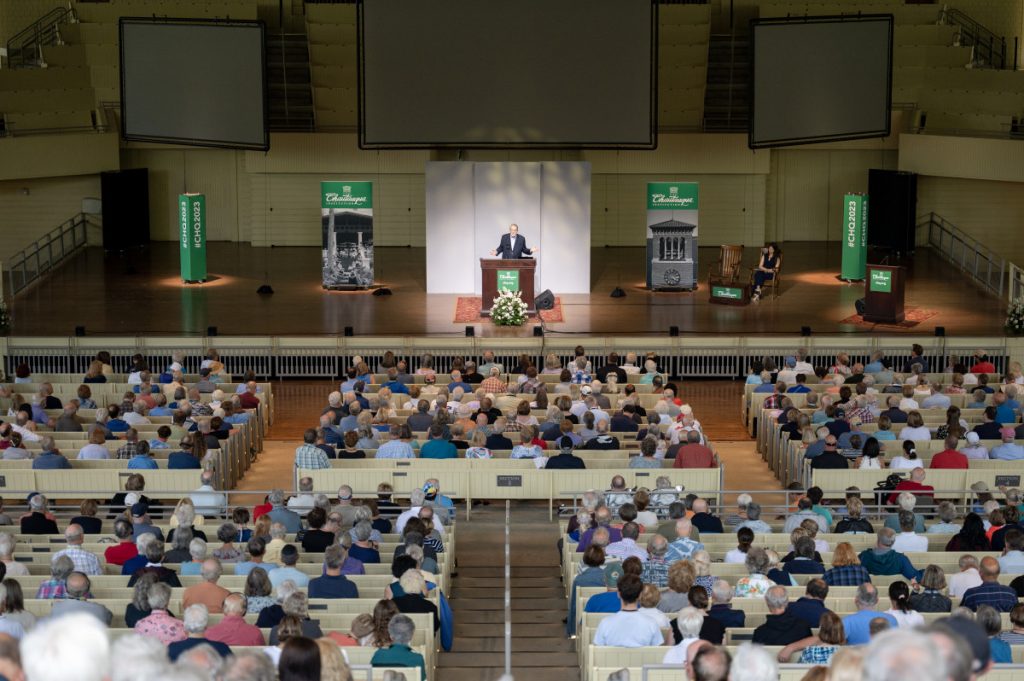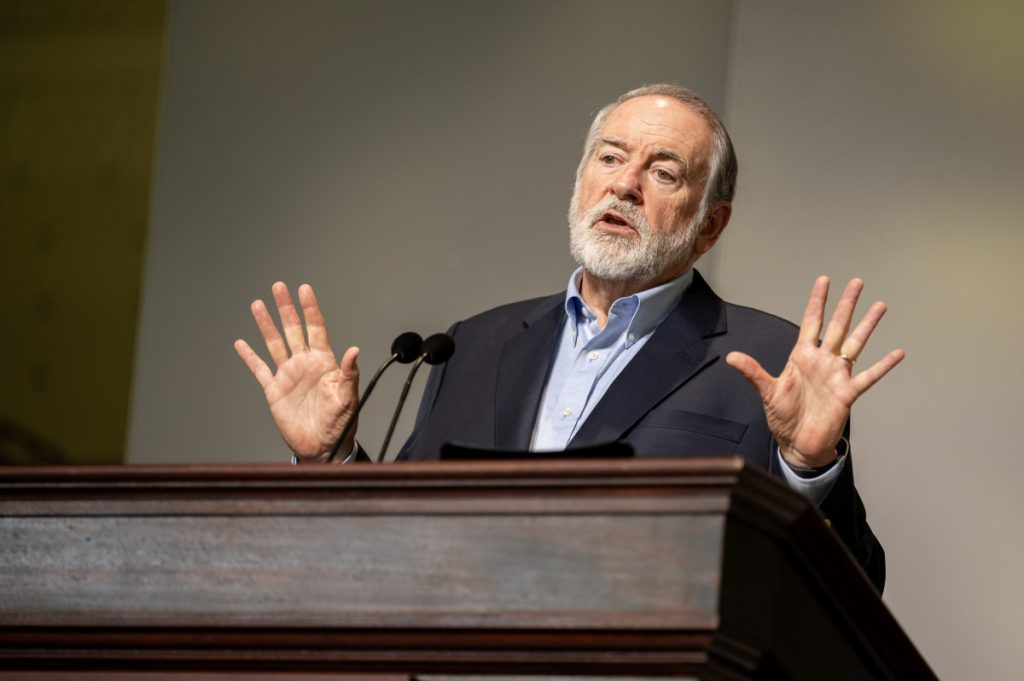
Alton Northup
Staff writer
Mike Huckabee may be the “highway governor,” but he argued that infrastructure is much more than new roads.
“Infrastructure is to a civilized people what our bones, muscle and connective tissue is to our physical body,” he said.
Huckabee, who ushered in a wave of infrastructure projects during his tenure as governor of Arkansas from 1996 to 2007, spoke on the importance of investing in it at 10:45 a.m. Tuesday in the Amphitheater to continue the Chautauqua Lecture Series Week Five theme, “Infrastructure: Building and Maintaining the Physical, Social and Civic Underpinnings of Society.”
Before he was a two-time candidate for the Republican presidential nomination, Huckabee was the 44th governor of Arkansas. Upon entering office, Huckabee inherited a road system that contributed $400 to $600 in repair costs per vehicle each year. He quickly made it his priority to restore the 319 miles of interstate highways in Arkansas.
To fund improvements, he did what very few Republicans do: He proposed a tax increase. By raising fuel tax by half a cent, the state could create a bond program for highway repairs. More than 80% of voters approved the measure, and the project finished ahead of deadline and below budget.

Infrastructure impacts everyone, Huckabee said. Someone may never use a shipping channel or airport, but the products that stock the shelves and the equipment that keep the lights on do.
“It’s a foolish thing for people to say, ‘Well, I don’t care about infrastructure because all I do is live in my small community,’ ” he said. “It’s necessary for us to build an infrastructure that actually works.”
Beyond the highways, sewer systems, electric grid and broadband networks, the soft infrastructure – the legal system, education, healthcare system, public safety, the arts and sports – is also important.
“These are the elements that make us civilized people,” he said.
Huckabee asked the crowd to imagine a mythical place called “Huck Town,” where there is no court system because nobody breaks the law, insurance is inexpensive because nobody speeds along the interstate, taxes are low because there is no crime and addiction is non-existent. Soft infrastructure binds the societal contract, he said, and when it is broken, everyone pays.
As governor, his staff conducted an analysis on the economic contributions of a college graduate who becomes a school teacher compared to a teen arrested for drug use. A teacher who stays in the public school system until retirement contributes about $1.2 million to the state in their lifetime, he said. A teen who goes to prison on a drug charge and becomes a repeat offender, he said, costs the state $2.5 million in their lifetime.
Because the cost of just one person breaking the social contract is so high, “we all have a vested interest in the soft infrastructure of a society that functions,” Huckabee said.
One of the biggest policy failures of the last 30 years were three-strikes laws, he said, which imposed longer sentences for certain repeat offenders. The scheme, he argued, put reckless teenagers in prison for life when there were more appropriate alternatives.
In all 50 states, it costs more money to put a person in prison for one year than it does to put them in a state university, pay full tuition, room and board, buy their books and give them spending money, he said.
A long-time musician, Huckabee called art and music “weapons of mass instruction.” During his tenure as governor, he mandated art and music programs for students to force the hand of school districts and state legislators unwilling to pay for its inclusion in curricula. Students who participated in these programs, he said, advanced in subjects across the board and found outlets for their frustrations.
“We would make a more civilized society if we put a focus on music and the other arts,” he said.
Infrastructure is also personal for Huckabee. A native of Hope, Arkansas, he said he never would have become governor and made it out of his shotgun house in the town of less than 10,000 people if it were not for the infrastructure connecting it to other communities.
“Where else but the United States of America could a kid from my background even aspire such a thing?” he said. “Part of the reason that this nation has been so good to me, and that I love it, is because it always has invested in infrastructure that said whether you’re rich or poor, you can drive on the highway.”
To better serve communities, investments in infrastructure should happen at the state and local levels, particularly through needs-based block grants, he said. Regardless of how it happens, he said, Democrats and Republicans should all support infrastructure investments.
“We need to make sure that we continue to put the focus on an infrastructure that creates an opportunity for every single boy and girl in this country growing up,” Huckabee said. “If we do that, we’ll appreciate the infrastructure that we have and that we have given to the next generation.”




